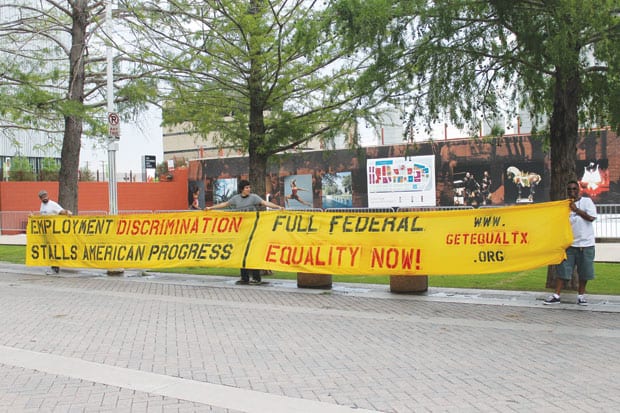Company extends healthcare plan to married same-sex couples, but few see it as real change in itsviews toward LGBT employees

EMPTY TANK | GetEQUAL demonstrators hold a sign outside the Meyerson during Exxon’s shareholders meeting in 2012. The number of LGBT protesters has dwindled over the years. (Anna Waugh/Dallas Voice)
Despite ExxonMobil beginning to offer healthcare benefits to same-sex spouses with a valid marriage license, the Human Rights Campaign doesn’t foresee changing its Corporate Equality Index rating from minus-25.
Deena Fidas coordinates the annual HRC business-rating guide.
“My response is tempered,” she said. “These are not domestic partner benefits. The reality is still ExxonMobil has consistently refused to amend their equal opportunity policy.”
The company announced late last week that it would allow same-sex spouses of legally married couples to enroll in its insurance plan, starting this week. But the company hasn’t changed any of its other policies and doesn’t include sexual orientation or gender identity in its Equal Employment Opportunity policy.
Since marriage is not legal in Texas where the oil company is based, employees at the Irving headquarters or exploration and producing operations in Houston would have to travel across the country to obtain a marriage license. Upon return, they’d have to out themselves at a company that doesn’t guarantee their protection, Fidas said.
She called the announcement “a small step forward.”
The new benefit was announced on Sept. 27. Open enrollment for healthcare began Oct. 1. If a couple wanted to take advantage of the healthcare plan, they would have had to travel over the weekend to get married.
Fidas said she tried to get clarification from ExxonMobil if marriage by same-sex couples would be considered an event for purposes of enrollment. That would allow a newly married spouse to enroll during the year and not have to wait until the annual open enrollment.
The company didn’t respond to her question.
Resource Center CEO Cece Cox wondered if the change was a PR stunt or simply an announcement of something they’re legally obligated to do.
In September, the Department of Labor issued guidelines that said legally married gay or lesbian couples can participate in employee benefit plans, even if the state they live in doesn’t recognize same-sex marriage.
“Not a lot has changed in my opinion,” Cox said.
She noted that the company has eliminated benefits and rights for employees brought in from Mobil and XTO Energy that have still not been restored.
Cox said the resistance by ExxonMobil to add nondiscrimination to its EEO policy illustrates the continuing need for the federal Employment Non-Discrimination Act.
New York state Comptroller Thomas DiNapoli has been behind a shareholder initiative for the past four years to add nondiscrimination to the EEO policy. The comptroller oversees the state retirement fund that currently owns more than 13 million shares of Exxon worth $1.2 billion.
Since 2010, DiNapoli has reached more than 30 agreements with companies in the state’s portfolio to implement equal-employment policies that prohibit discrimination based on sexual orientation or gender identity.
George Wong spoke at the annual ExxonMobil shareholders meeting in Dallas representing the New York’s retirement fund, arguing that without a nondiscrimination policy, the company is put at a competitive disadvantage.
DiNapoli has argued that if ExxonMobil does business in New York, it doesn’t have the right to pick and choose which New York-issued marriage licenses to honor for its employees. In addition, the company is violating the state’s nondiscrimination law.
“Today’s announcement by ExxonMobil shows the tide is continuing to turn in corporate America,” DiNapoli wrote in a statement about the healthcare benefit. “This is a very positive step for the LGBT community and a vindication of years of efforts by shareholders and activists across the country.”
He called discrimination against LGBT employees “simply not good business.”
Eric Sumberg, a spokesman for DiNapoli’s office, said they would decide by spring whether to file another shareholder resolution to include LGBT protections in the company’s EEO policy.
“We’re certainly going to be examining what the new policy means in relation to the written EEO policy,” Sumberg said.
ExxonMobil’s minus-25 score on HRC’s CEI reflects points taken away for “responsible citizenship.” Opposing shareholder resolutions related to promoting an inclusive workplace or donating to organizations whose primary mission are to advocate against LGBT equality are “public blemishes” that result in 25 points being deducted from the score. The company loses points each year for opposing the shareholder resolution.
If ExxonMobil added LGBT protections to its EEO policy, HRC would likely stop giving the company the 25-point penalty. In addition, it would get 15 points for adding sexual orientation and 15 points for adding gender identity and might even get 15 points for healthcare coverage for a total of 45 points.
For the 2013 CEI released last year, Chevron scored a perfect 100. Shell rated 95 and BP received 90.
This article appeared in the Dallas Voice print edition October 4, 2013.

